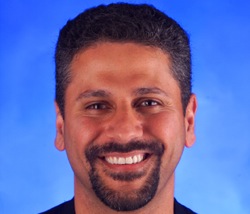 Microsoft founder Bill Gates may not want to comment on Chrome OS, the just-announced operating system from Google. But Walid Abu-Hadba, the software giant’s Vice President of Developer and Platform Evangelism, was more forthcoming tonight about his thoughts on Google’s supposed threat to Windows.
Microsoft founder Bill Gates may not want to comment on Chrome OS, the just-announced operating system from Google. But Walid Abu-Hadba, the software giant’s Vice President of Developer and Platform Evangelism, was more forthcoming tonight about his thoughts on Google’s supposed threat to Windows.
I spoke to Abu-Hadba at a dinner in San Francisco to promote tomorrow’s launch of Silverlight 3, the latest version of Microsoft’s platform for web media and applications. Some of his remarks about Chrome consisted of entertaining bluster: “I love competition.” But he also had thoughts about why Google is trying to muscle into the operating system business. And no, he said, it’s not because Google wants to make computing simpler and faster (as Google executives claim), nor is it part of a grand plan to undo Microsoft’s dominance (as VentureBeat writer Dean Takahashi speculated).
“Most of what Google does is defensive,” Abu-Hadba said.
You may be wondering how Google can be playing defense when it’s entering a market for the first time, but Abu-Hadba said it’s not about operating systems at all; instead, Google is trying to distract competitors from attacking its cash cow, search. He argued that whenever Google enters a new market, like releasing mobile operating system Android, it’s trying to force competitors to focus on existing products, rather than challenging Google in search. And the company may actually feel threatened for the first time in years, since Microsoft recently made a splash with its revamped “decision engine” Bing, and traffic appears to be growing (sort of — see Search Engine Land’s analysis).
June 5th: The AI Audit in NYC
Join us next week in NYC to engage with top executive leaders, delving into strategies for auditing AI models to ensure fairness, optimal performance, and ethical compliance across diverse organizations. Secure your attendance for this exclusive invite-only event.
You could argue that Microsoft itself is making a similar move with Silverlight, which is taking on Adobe’s more established Flash platform. Not surprisingly, Abu-Hadba describes things a bit differently. It’s less about taking market share from Adobe, and more about improving Microsoft’s overall platform for the development of software, he said. And as for Adobe, Abu-Hadba said the company’s past focus on designers makes it poorly equipped to compete as a development platform. In fact, he predicted that, in 10 or 15 years, Adobe will have either died or transformed dramatically.
“They don’t know how to deal with developers,” he said.
